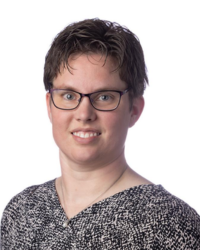Candidate Bio

Dr. Monica Ott, MD, CMD currently serves as the market medical director for the Missouri/Illinois/Kansas market of Senior Community Care within Optum. Optum is a health solution and care delivery organization and part of United Health Group. The Optum ISNP (Institutional Special Needs Plan) provides care delivery and coordination to long-term care nursing home residents in more than 1800 facilities. Advance practice clinicians (APCs) provide the right care, at the right time, in the right place to avoid unnecessary hospitalizations. As a market medical director, Dr. Ott supervises and educates APCs in three states. She led the Medication OPTUMization initiative to reduce anticholinergic antihistamines, anticholinergic bladder agents, dementia medications, proton pump inhibitors, combination of antiplatelets and anticoagulants, muscle relaxants, and CNS (central nervous system) active medications over the past three years.
Prior to joining Optum, Dr. Ott worked for ten years as faculty in the Department of Internal Medicine and Geriatrics at Indiana University teaching medical students, residents, and geriatric fellows. She also served as the medical director of OPTIMISTIC (Optimizing Patient Transfers, Impacting Medical Quality, and Improving Symptoms: Transforming Institutional Care), a CMS Innovation grant (2013-2020) designed to reduce avoidable hospitalizations in nursing home residents. Dr. Ott won the Tony & Mary Hulman Health Achievement Award in Geriatrics & Gerontology in 2018.
Dr. Ott graduated from Saint Louis University school of medicine and completed a geriatric fellowship at SLU. She is board certified in Family Medicine and Geriatrics. Dr. Ott began providing care to nursing home residents in 2009 and became a certified medical director in 2012. She has been active in AMDA since attending the Futures program in 2009. She previously served on the Clinical Practice Guidelines committee from 2015-2017. Dr. Ott is a member of the Indiana Medical Directors Association and served as chapter president from 2012-2014, treasurer from 2010-2014, and general board member from 2010-2012 and 2014-2021.
Dr. Ott was the Choosing Wisely Champion in 2022 and won the Howard Gutterman award for top poster presentation at AMDA in 2015. Dr. Ott has presented at the annual conference multiple times including: Atrial Fibrillation, Pulmonary Embolism, Deep Vein Thrombosis, Bleeding, Oh My! (2024); Medication Confusion: How to Reduce Multiple Categories of Brain Active Medications (2023); How to “Sell” Deprescribing to Patients & Families and Medication Optimization on a Large Scale: Collaboration between an Institutional Special Needs Program, a Medical Provider Group and a Skilled Nursing Facility Organization (2022); Managing Infections in the Nursing Home: Lessons from the OPTIMISTIC Demonstration Project (2019); Dementia Behavioral Dilemmas: Facility Level Interventions (2016); Remaining OPTIMISTIC: The Launch of the IU CMS Demonstration Project (2013).
Candidate Statement
AMDA is my professional home. I have been to every meeting since 2009 when I attended the Futures program except for 2023 when I was too ill to travel. It is an honor to be nominated as a state president’s council representative. Over the past 14 years, I have had the privilege of being mentored by many AMDA members. Now, I serve as a mentor for physicians and advance practice clinicians who work in long-term care. On a weekly basis, I talk about not just the electronic resources but the people, the network, and the society. Having previously served as the Indiana state chapter president, I know how important it is for AMDA to know about the issues we face locally.
Covid shined a spotlight on nursing home care. Nursing home staff shortages and staff turnover are not new but even worse. Nursing home residents are more medically complicated, and their families can be incredibly unrealistic. Many facilities lack access to reliable and timely labs and imaging. These are not just rural facilities or small facilities. On September 1, 2023, CMS released a proposed rule that would create new requirements for nurse staffing levels in nursing facilities including a minimum of 0.55 RN and 2.45 nurse aide hours per resident day. Currently only 20% of facilities meet that requirement. Even though we all like the idea of more nurse and aide time with the residents, we also know that this mandate comes without a source of funding. Where will these additional staff come from when the facilities already struggle to fill their current openings? How do we recruit talented compassionate people to work in our beloved nursing homes? As one individual or one chapter we cannot adequately address these struggles. As a society, we can and will. Over the past 14 years, the society has tackled deprescribing, dementia behavior management, burnout, Covid, influenza, and so many other issues. Together we are stronger.

